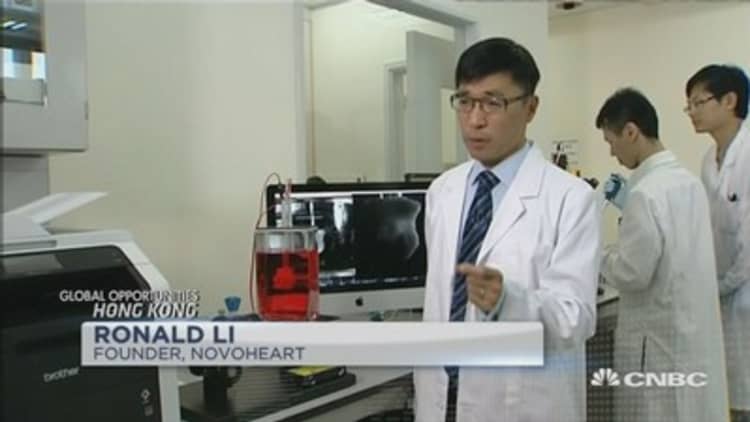
As the head of the Hong Kong Science & Technology Parks (HKSTP) Corporation, Allen Ma is no stranger to the term "white elephant."
The unflattering term, used to describe high maintenance projects that yield little benefit, is a label one of HKSTP's properties, the Hong Kong Science Park, has sometimes been tagged with.
"I think it's a very unfair term," Ma said, adding that there is no lack of interested parties waiting to move into the tech facility.
Ma told CNBC that phases one and two of the Science Park were nearly fully occupied, while the third research and development (R&D) phase that opened in September last year was half full.
"If we open up the floodgates and allow everyone to come to the Science Park, it is going to 100 percent occupied. But we are very strict in terms of the kind of companies we want to attract," he explained.
Set up in 2001, HKSTP's role is to drive the development of Hong Kong as a regional hub for innovation, through managing the Hong Kong Science Park, InnoCentre and Industrial Estates.
Its strategy is straightforward; create a vibrant tech ecosystem that attracts the best and the brightest, that will then act as a catalyst for innovation and deliver economic benefits to Hong Kong.
But as the region's competition for talent intensifies, Ma said putting the best physical facilities in place may not be enough.
"Infrastructure is no longer a differentiation, every science park in the world has the infrastructure. What makes us different from the other science parks is the services that we offer," he said.
That includes marketing and hiring support, plus steps to help connect companies to funding by venture capitalists and angel investors.
Its effort is beginning to bear fruit.
Last year, the Science Park facilitated a record number of deals for its tenants.
"We attracted close to 200 million Hong Kong dollars ($25.8 million) of new investment into companies at the Science Park last year, and I am very confident we are going to exceed this number this year," Ma said.
Another coup was convincing the world's largest consumer drone manufacturer, DJI, to undertake next phase of R&D in Hong Kong.
Read MoreHong Kong 1% shun Europe markets as well as China
The Shenzhen-based company moved part of its operations to Hong Kong Science Park in February this year, occupying a 20,000 square-foot facility.
"DJI has always used Hong Kong as a logistic and international talent hub," said DJI's spokesperson Michael Perry, adding that the move was mostly to tap on young Hong Kong engineers who wanted to develop their robotic skills.
Of course, it helps that DJI founder, mainland-born Frank Wang Tao, was a graduate from the Hong Kong University of Science and Technology.
Hong Kong's drawbacks are its limited space and high costs, said Perry, but initiatives like the Science Park did help lower some of those barriers.
"One of the amazing things about Science Park is that they actually allow us to have the space to go out and fly, test new equipment and try new things," said Perry.
As a drone-maker, DJI faces unique challenges on the regulatory front, including the openness of the local city toward developing commercial applications for the drones.
"A lot of cities and countries don't have a common rule, so that's something that we're looking to develop as we go along," he said.
Read MoreSchools wasting money on computers for kids: OECD
Another company that chose to build its home at the Hong Kong Science Park is bio-tech company, Novoheart.
Its founder, local-born and U.S. educated Ronald Li, said Hong Kong's edge lies in being part of China, albeit one with a stronger regulatory environment.
However, there are still frustrations.
"The local community is not entirely familiar with the sector (unlike) the U.S., EU where the industry is more established, and there are professionals who know how to evaluate what you're trying to get done.
"But the market there is also more saturated, so there are more competitors. So it is a give and take situation, different places have different issues and you have to learn how to manage," Li said.
Despite that disadvantage, Li is confident that Hong Kong can speed up, and catch up.
"Hong Kong has a very strong track record for bringing things from zero to prominence; supporting small, medium enterprise in the 1970s, to becoming a global financial market in the 1980s, 1990s. We also saw Hong Kong becoming a global wine hub within just a few years. So I think with the right policy push, things can happen very quickly," he said added.


